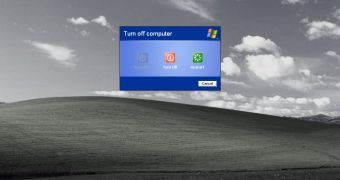It’s no secret that Windows XP support is coming to an end in April, but Microsoft continues efforts to move users to a newer platform, especially because 29 percent of desktop computers worldwide are still running it right now.
According to a new study conducted by research firm IDC and published by midigitalfc.com, the costs of Windows XP maintenance after April 8 could grow to no less than $300 (€220), up from a maximum of $100 (€73) right now.
While that’s three times more than current costs, it’s pretty obvious that keeping a Windows XP computer fully protected without Microsoft support is quite a challenge, despite the fact that many antivirus vendors have already confirmed that all their apps will continue to work on this platform after end of support comes.
Microsoft, on the other hand, warns that, once end of support arrives, Windows XP computers will no longer be protected, which means that everyone should make the move to an operating system that’s still supported right now and receives updates and security patches.
The number one choice should be Windows 8.1, Microsoft recommends, even though statistics have proved that Windows 7 continues to be the number one destination for the majority of users out there.
“After April 8, 2014, Microsoft will no longer provide security updates or technical support for Windows XP. Security updates patch vulnerabilities that may be exploited by malware and help keep users and their data safer,” Microsoft said in a statement.
“PCs running Windows XP after April 8, 2014, should not be considered to be protected, and it is important that you migrate to a current supported operating system – such as Windows 8.1 – so you can receive regular security updates to protect their computer from malicious attacks.”
With approximately 40 days left until Microsoft pulls the plug on Windows XP, approximately 29 percent of the users are still running the platform, which is probably the most obvious sign that the transition to a newer operating system is unlikely to complete in time.
The problem with the Windows XP migration is that newer operating systems also require upgraded hardware, which means that the process could in the end prove to be a very costly decision. Microsoft indeed says the same thing, but recommends users to purchase Windows 8.1 PCs as soon as possible.
“If your current PC meets the system requirements for Windows 7 or Windows 8.1, you can buy Windows 7 Professional or Windows 8.1 Pro from a local retailer or Microsoft Certified Partner. If your PC does not meet system requirements, consider purchasing a new business PC with Windows 8.1 Pro.”

 14 DAY TRIAL //
14 DAY TRIAL //